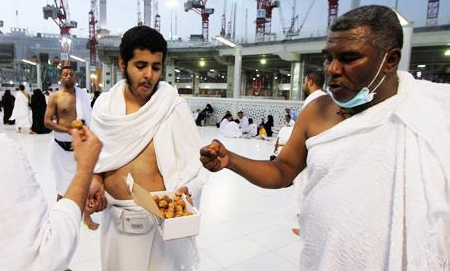 Jeddah, Jul 1: Philanthropists will distribute more than 7.5 million packets of iftar meals among worshippers at the Grand Mosque in Makkah throughout Ramadan.
Jeddah, Jul 1: Philanthropists will distribute more than 7.5 million packets of iftar meals among worshippers at the Grand Mosque in Makkah throughout Ramadan.
“Everyday they supply 250,000 iftar meals, of which 80,000 meals are distributed in the northern courtyard and 70,000 in the southern courtyard,” said an official in charge of distributing the meals.
“We also distribute 90,000 to 120,000 meals in Azza and Shamiya courtyards,” the official said, adding that a large number of young Saudis participate in the massive operation.
The Charitable Warehouse in Makkah said it has set out a plan to distribute 90,000 iftar meals inside the mosque and 120,000 meals among worshippers sitting in the courtyards. “We are taking help of 120 workers,” said Abdullah Al-Nafie, director of the charity.
He added that the workers are trained for 20 hours with the support of the Dawa Center in Makkah.
Mohammed Ali, a volunteer, said he was happy to distribute iftar meals among the pilgrims and other worshippers at the Grand Mosque.
“I come to the Haram with other friends after Asr to participate in this noble program. We are doing this only to get the reward from the Almighty.”
Abdul Wahid Al-Qurashi, another volunteer said: “I have been participating in this program for the last many years. Iftar meals are distributed among worshippers sitting inside and outside the mosque. It’s a big operation and needs the support of many volunteers.”






Comments
Add new comment